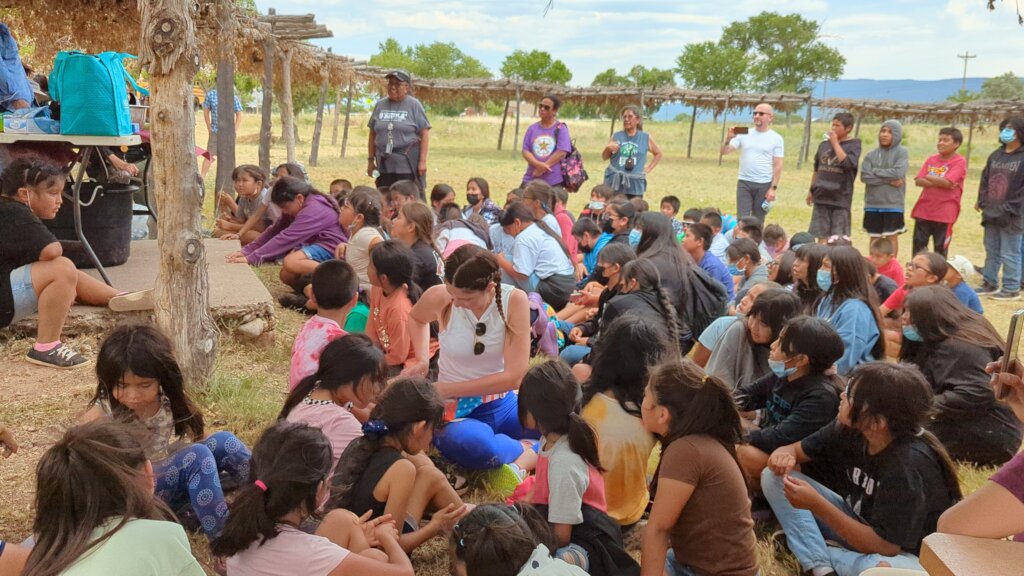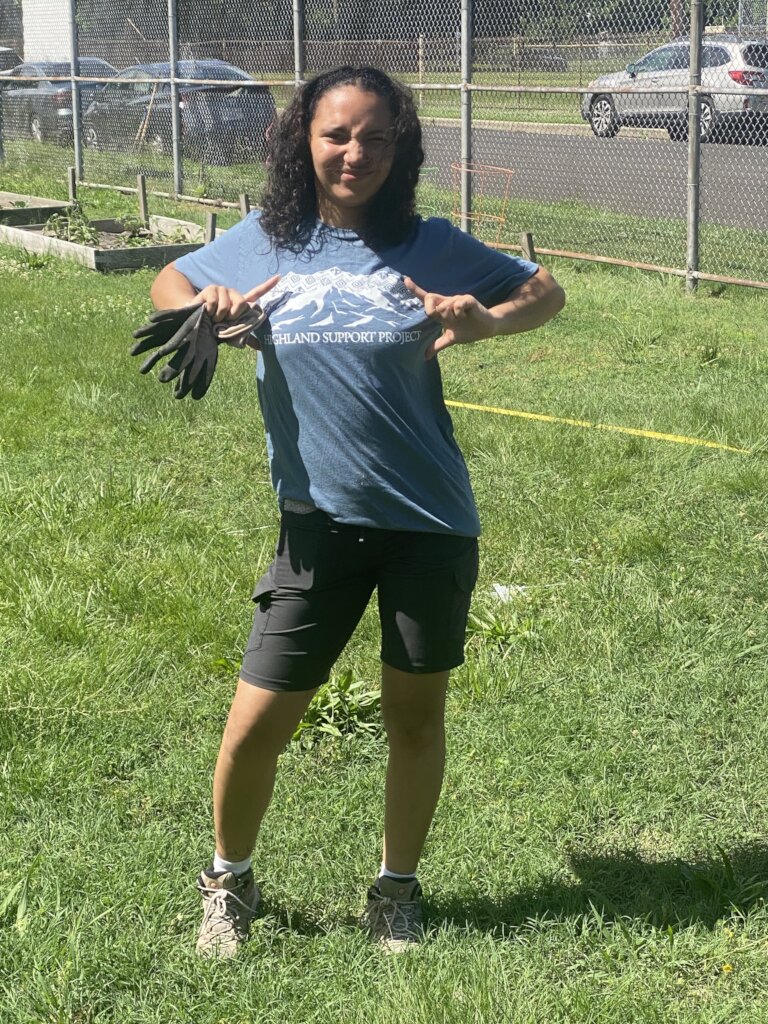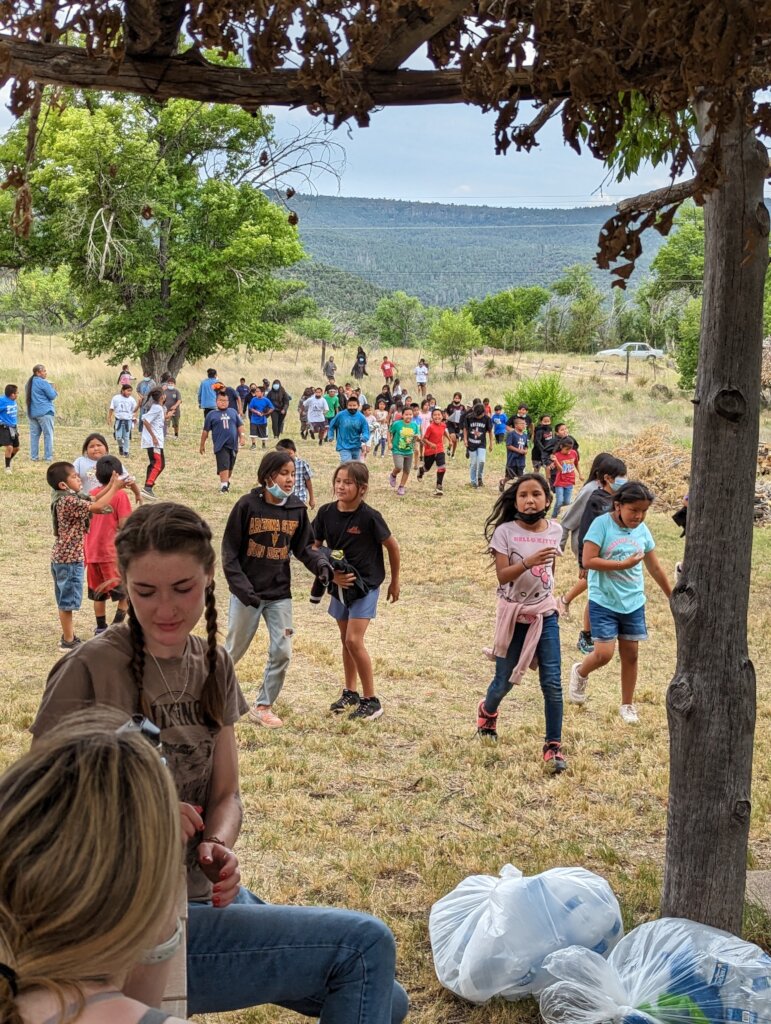By Ben Blevins | Deep Educator
Executive Summary
The Decolonizing Education Program on the White Mountain Apache Reservation is a testament to the power of locally driven innovation and collaboration. This initiative supports tribal educators in bringing dynamic, forward-thinking educational activities to their communities while honoring the vital role of tribal members as caretakers of ancestral knowledge. By facilitating connections between local change makers and educators from other communities with shared goals, the program creates opportunities for collaboration, resource sharing, and collective growth.
Key activities planned for June include a wild food gathering workshop led by Shy Peaches, a community partner whose focus is deeply rooted in Apache traditions, and collaborative sessions with Kaya Harrison from HSP’s Deep Ecology Education Program in Richmond, Virginia. These efforts exemplify HSP’s commitment to empowering culturally relevant education and fostering sustainable practices through partnerships that respect and uplift local knowledge and expertise.
Background
The Decolonizing Education Program was initiated to address the erosion of cultural knowledge and environmental degradation in Indigenous communities. Grounded in the understanding that lasting change emerges from within, the program focuses on supporting local leaders as they design and deliver culturally and ecologically relevant education.
HSP is supportive by providing resources, expertise, and connections to educators and organizations engaged in similar work. The program aims to strengthen efforts that blend traditional wisdom with innovative practices, fostering cultural revitalization and environmental sustainability. At its core, the program strives to empower future generations by equipping them with the tools to sustain their unique heritage and the ecosystems they call home.
Planned Activities for June Wild Food Gathering Workshop
This June, Shy Peaches, a trusted community leader and advocate for cultural renewal, will guide tribal youth through an immersive wild food gathering workshop. Supported in part by HSP, this workshop will provide participants an opportunity to deepen their understanding of Apache Foodway customs. Youth will explore the local environment, gaining hands-on experience identifying, gathering, and preparing native plants.
Through this experience, students will learn the traditional names and uses of plants, their significance in Apache culture, and their ecological roles. Additionally, botany and ecosystem health lessons will emphasize the interconnectedness of cultural practices and environmental stewardship. This workshop reinforces cultural knowledge and cultivates a profound sense of identity and responsibility among participants by linking them to their heritage.
Deep Ecology Education Collaboration
Kaya Harrison, an expert from HSP’s Deep Ecology Education Program in Richmond, Virginia, will join the June programming to share her work in building sustainable community education initiatives. Kaya will collaborate directly with tribal educators to demonstrate how innovative, evidence-based ecological education strategies can be adapted to the unique cultural and environmental settings of the White Mountain Apache Reservation.
Her sessions will focus on topics such as soil restoration techniques that can benefit low-income communities, emphasizing hands-on, actionable approaches accessible to local schools and educators. By connecting her work in Richmond to the White Mountain Apache context, Kaya offers insights into how educational frameworks can be tailored to different environments while addressing shared challenges. Crucially, these exchanges promote a two-way flow of ideas, creating a space for mutual learning and amplifying context-specific innovation.
Broader Impacts
The planned activities for June are pivotal examples of the Decolonizing Education Program’s broader mission to support local educators and actors who champion cultural preservation and ecological education. These initiatives create ripples of positive change that extend well beyond individual workshops.
The Soil School InitiativeIntegrating Science, Fieldwork, and Equity
The Deep Ecology Education Program (DEEP) has spearheaded the development of the Soil School, an innovative educational initiative designed to address inequities in farming and gardening for low-income communities. Rooted in the belief that education can inspire action, the Soil School combines rigorous science instruction with hands-on fieldwork. Participants engage with practical techniques to restore soil health and learn to apply them in their communities, fostering self-reliance and environmental stewardship.
The initiative goes beyond traditional classroom settings, offering participants dynamic lab experiences directly in the field. By grounding the curriculum in accessible, actionable science, the program makes advanced ecological concepts relevant and achievable for learners of all backgrounds. This approach ensures that underserved communities have the tools to build sustainable food systems while addressing systemic barriers of access in agriculture.
Educating Through Counter-Storytelling
A key element of the Soil School is its commitment to counter-storytelling, which seeks to reframe narratives around science and innovation. Through this lens, participants learn about Terra Preta, or Amazonian Dark Earth, an ancient soil improvement method that highlights the scientific ingenuity of Indigenous cultures. Teaching about Terra Preta provides a tangible example of sustainable agricultural practices and challenges the dominant perception that innovation is a product of modern science alone. Instead, it centers ancestral knowledge and demonstrates that Native cultures have long been at the forefront of scientific discovery and environmental management.
Terra Preta: A Marvel of Indigenous Ingenuity
Developed over 2,000 years ago by Indigenous communities in the Amazon Basin, Terra Preta remains a groundbreaking example of sustainable land use. This engineered soil was created by enriching nutrient-poor, acidic soil with a blend of organic materials such as food waste, animal bones, pottery shards, and biochar, a form of charcoal made from the incomplete combustion of biomass. The addition of biochar is particularly significant because of its ability to improve soil structure, retain nutrients, and support microbial activity.
What sets Terra Preta apart is its remarkable longevity. Unlike most soils, which degrade over time, Terra Preta remains highly fertile centuries after its creation, hosting diverse microbial life and retaining nutrients far more effectively than surrounding soils. This innovative agricultural technique allowed ancient farmers to cultivate sustainable food systems in challenging environments, offering a timeless model for addressing modern-day soil degradation and food insecurity issues.
The Intersection of Tradition and Modern Application
By teaching students about Terra Preta, the Soil School emphasizes the lasting value of Indigenous knowledge while bridging it with contemporary ecological science. Creating biochar using waste materials mirrors the ingenuity of Terra Preta’s creators and provides a modern, accessible solution for communities striving to improve soil health. Workshops on biochar production and application offer students practical tools to revitalize their own gardens and farms while reinforcing the importance of drawing on lessons from the past.
Broader Impacts of the Soil School
The Soil School’s focus on integrating traditional wisdom with hands-on science education and addressing systemic inequities has profound implications. It empowers participants to see themselves as scientists and custodians of their environment, challenging conventional narratives and fostering pride in ancestral knowledge. Additionally, by equipping communities with low-cost, sustainable soil restoration techniques inspired by Terra Preta, the program reduces reliance on commercial inputs, creating pathways to food sovereignty and environmental resilience.
By showcasing Terra Preta as a centerpiece of the Soil School curriculum, DEEP highlights the scientific excellence of Indigenous cultures. It provides a living example of how ancient practices can inform and enhance contemporary approaches to agriculture and education. This initiative exemplifies the holistic vision of the Decolonizing Education Program, furthering its mission to blend cultural heritage with ecological innovation for a just and sustainable future.
Conclusion
The Decolonizing Education Program remains vital for fostering community-led innovation and collaboration on the White Mountain Apache Reservation. By supporting tribal educators and highlighting the indispensable role of local members as custodians of cultural knowledge, the program builds bridges between tradition and modern education. Initiatives such as the wild food gathering workshop and Kaya Harrison’s collaboration exemplify how HSP works to amplify local leadership, nurture cross-community connections, and inspire a collective vision for education rooted in sustainability and cultural pride. Through these efforts, the program contributes to a shared future of resilience, creativity, and respect for the invaluable ties between people and their environment.
Project reports on GlobalGiving are posted directly to globalgiving.org by Project Leaders as they are completed, generally every 3-4 months. To protect the integrity of these documents, GlobalGiving does not alter them; therefore you may find some language or formatting issues.
If you donate to this project or have donated to this project, you can receive an email when this project posts a report. You can also subscribe for reports without donating.
Support this important cause by creating a personalized fundraising page.
Start a Fundraiser

